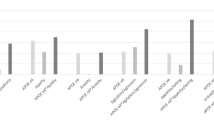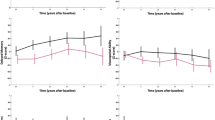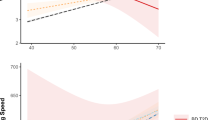Abstract
Later-life psychotic symptoms are meaningful and are associated with adverse outcomes. Psychosis is an important domain in mild behavioural impairment (MBI), a syndrome that incorporates later-life emergent and persistent neuropsychiatric symptoms (NPS) in dementia-free individuals into dementia prognostication. However, MBI-psychosis-associated risk and its interaction with race has not been well quantified. Here we determined risk of incident dementia in dementia-free participants with MBI-psychosis and effect modification by race as an important factor in assessing the risk of psychosis. Data for participants with normal cognition (NC) or mild cognitive impairment (MCI) from the National Alzheimer Coordinating Centre were used. Participants with neurodevelopmental, neurological and/or longstanding psychiatric disorders were excluded. MBI-psychosis was defined by persistence of delusions and hallucinations across two consecutive visits. Kaplan–Meier curves of ten-year dementia-free survival were generated for MBI-psychosis versus no NPS before dementia diagnosis. Cox proportional hazard models were implemented to assess relative incidence rates, adjusted for cognitive status, age, sex, education, race and APOE-ε4 status. Interaction terms were included for relevant demographic variables. Similar secondary analyses utilized MBI-no-psychosis as reference. The sample consisted of 3,704 no-NPS (age = 72.8 ± 9.9; 62.7% female; 13.4% MCI) and 66 MBI-psychosis (age = 75.2 ± 9.8; 53% female; 72.7% MCI) participants. For MBI-psychosis, in reference to no NPS, the hazard ratio (HR) for incident dementia was 3.76 (CI: 2.53–5.58, p < 0.001), while for conventionally captured psychosis, the HR was 1.92 (CI: 1.58–2.33, p < 0.001). Interaction analyses revealed that in NC, those with MBI-psychosis had a 9.96-fold greater incidence of dementia than those with no NPS (CI: 3.65–27.22, p < 0.001). In MCI, the MBI-psychosis-associated dementia incidence was 3.38-fold greater than no-NPS (CI: 2.22–5.15, p < 0.001). Furthermore, MBI-psychosis-associated dementia incidence in Black participants was 7.44-fold greater than no NPS (CI: 3.54–15.65, p < 0.001), while in white participants, it was 3.18-fold greater (CI: 1.94–5.2, p < 0.001). In a secondary analysis, compared with MBI-no-psychosis (n = 2,260), MBI-psychosis had a 2.47-fold greater incidence of dementia (CI: 1.69–3.59, p < 0.001). Although psychosis is an infrequently endorsed MBI domain, when present it is associated with substantial risk for dementia. HRs differed between cognitive strata, and these differences were significantly greater when MBI-psychosis emerged in NC as opposed to MCI, emphasizing the importance of cognitive assessment at the time of symptom emergence. In addition, the relationship between MBI-psychosis and incident dementia was stronger in Black participants than in white participants. The emergence of persistent psychotic symptoms in older adults is clinically meaningful, and MBI-psychosis identifies a high-risk group for precision medicine approaches to dementia prevention.
This is a preview of subscription content, access via your institution
Access options
Subscribe to this journal
Receive 12 digital issues and online access to articles
$59.00 per year
only $4.92 per issue
Buy this article
- Purchase on Springer Link
- Instant access to full article PDF
Prices may be subject to local taxes which are calculated during checkout



Similar content being viewed by others
Data availability
Data are available from NACC upon submission of a data access request (https://naccdata.org/requesting-data/data-request-process).
Code availability
Custom R codes are available online (https://github.com/mghahrem/psychosis_and_incidentdementia).
References
Steinberg, M. et al. Point and 5-year period prevalence of neuropsychiatric symptoms in dementia: the Cache County Study. Int. J. Geriatr. Psychiatry 23, 170–177 (2008).
Ropacki, S. A. & Jeste, D. V. Epidemiology of and risk factors for psychosis of Alzheimer’s disease: a review of 55 studies published from 1990 to 2003. Am. J. Psychiatry 162, 2022–2030 (2005).
Fischer, C. E., Ismail, Z. & Schweizer, T. A. Delusions increase functional impairment in Alzheimer’s disease. Dement. Geriatr. Cogn. Disord. 33, 393–399 (2012).
Wilson, R. et al. Hallucinations, cognitive decline, and death in Alzheimer’s disease. Neuroepidemiology 26, 68–75 (2006).
Scarmeas, N. et al. Delusions and hallucinations are associated with worse outcome in Alzheimer disease. Arch. Neurol. 62, 1601–1608 (2005).
Zahodne, L. B., Ornstein, K., Cosentino, S., Devanand, D. P. & Stern, Y. Longitudinal relationships between Alzheimer disease progression and psychosis, depressed mood, and agitation/aggression. Am. J. Geriatr. Psychiatry 23, 130–140 (2015).
Fischer, C. E. & Agüera-Ortiz, L. Psychosis and dementia: risk factor, prodrome, or cause? Int. Psychogeriatr. 30, 209–219 (2018).
Ismail, Z. et al. Psychosis in Alzheimer disease—mechanisms, genetics and therapeutic opportunities. Nat. Rev. Neurol. 18, 131–144 (2022).
Cummings, J. et al. Criteria for psychosis in major and mild neurocognitive disorders: International Psychogeriatric Association (IPA) consensus clinical and research definition. Am. J. Geriatr. Psychiatry 28, 1256–1269 (2020).
Jeste, D. V. & Finkel, S. I. Psychosis of Alzheimer’s disease and related dementias: diagnostic criteria for a distinct syndrome. Am. J. Geriatr. Psychiatry 8, 29–34 (2000).
Fischer, C. E. et al. Revisiting criteria for psychosis in Alzheimer’s disease and related dementias: toward better phenotypic classification and biomarker research. J. Alzheimers Dis. 73, 1143–1156 (2020).
Ismail, Z. et al. Neuropsychiatric symptoms as early manifestations of emergent dementia: provisional diagnostic criteria for mild behavioral impairment. Alzheimers Dement. 12, 195–202 (2016).
Creese, B. & Ismail, Z. Mild behavioral impairment: measurement and clinical correlates of a novel marker of preclinical Alzheimer’s disease. Alzheimers Res. Ther. 14, 2 (2022).
Mortby, M. E. Mild behavioral impairment: challenges facing a quickly developing evidence base. Int. Psychogeriatr. 33, 209–212 (2021).
Creese, B. et al. Mild behavioral impairment as a marker of cognitive decline in cognitively normal older adults. Am. J. Geriatr. Psychiatry 27, 823–834 (2019).
Matsuoka, T., Ismail, Z. & Narumoto, J. Prevalence of mild behavioral impairment and risk of dementia in a psychiatric outpatient clinic. J. Alzheimers Dis. 70, 505–513 (2019).
Tsunoda, K. et al. Early emergence of neuropsychiatric symptoms in cognitively normal subjects and mild cognitive impairment. J. Alzheimers Dis. 73, 209–215 (2020).
Ismail, Z. et al. Mild behavioral impairment and subjective cognitive decline predict cognitive and functional decline. J. Alzheimers Dis. 80, 459–469 (2021).
Wolfova, K. et al. Gender/sex differences in the association of mild behavioral impairment with cognitive aging. J. Alzheimers Dis. 88, 345–355 (2022).
McGirr, A. et al. Progression to dementia or reversion to normal cognition in mild cognitive impairment as a function of late-onset neuropsychiatric symptoms. Neurology. 98, e2132–e2139 (2022).
Taragano, F. E. et al. Risk of conversion to dementia in a mild behavioral impairment group compared to a psychiatric group and to a mild cognitive impairment group. J. Alzheimers Dis. 62, 227–238 (2018).
Kan, C. N. et al. Prevalence, clinical correlates, cognitive trajectories, and dementia risk associated with mild behavioral impairment in Asians. J. Clin. Psychiatry 83, 40123 (2022).
Vellone, D. et al. Apathy and APOE in mild behavioral impairment, and risk for incident dementia. Alzheimers Dement. (N Y) 8, e12370 (2022).
Yokoi, Y. et al. Discrete effect of each mild behavioural impairment category on dementia conversion or cognitive decline in patients with mild cognitive impairment. Psychogeriatrics 19, 591–600 (2019).
Tsamakis, K. et al. Dementia in people from ethnic minority backgrounds: disability, functioning, and pharmacotherapy at the time of diagnosis. J. Am. Med. Dir. Assoc. 22, 446–452 (2021).
Selten, J. P., van der Ven, E. & Termorshuizen, F. Migration and psychosis: a meta-analysis of incidence studies. Psychol. Med. 50, 303–313 (2020).
Pan, Y. et al. Prevalence of mild behavioural impairment domains: a meta-analysis. Psychogeriatrics 22, 84–98 (2022).
Ismail, Z. et al. The Mild Behavioral Impairment Checklist (MBI-C): a rating scale for neuropsychiatric symptoms in pre-dementia populations. J. Alzheimers Dis. 56, 929–938 (2017).
Creese, B. et al. Profile of mild behavioral impairment and factor structure of the Mild Behavioral Impairment Checklist in cognitively normal older adults. Int. Psychogeriatr. 32, 705–717 (2020).
Hu, S. et al. Validating the mild behavioral impairment checklist in a cognitive clinic: comparisons with the neuropsychiatric inventory questionnaire. J. Geriatr. Psychiatry Neurol. 36, 107–120 (2022).
Dietlin, S. et al. Neuropsychiatric symptoms and risk of progression to Alzheimer’s disease among mild cognitive impairment subjects. J. Alzheimers Dis. 70, 25–34 (2019).
Brodaty, H., Sachdev, P., Koschera, A., Monk, D. & Cullen, B. Long-term outcome of late-onset schizophrenia: 5-year follow-up study. Br. J. Psychiatry 183, 213–219 (2003).
Kohler, S. et al. Cognitive decline and dementia risk in older adults with psychotic symptoms: a prospective cohort study. Am. J. Geriatr. Psychiatry 21, 119–128 (2013).
Liew, T. M. Symptom clusters of neuropsychiatric symptoms in mild cognitive impairment and their comparative risks of dementia: a cohort study of 8530 older persons. J. Am. Med. Dir. Assoc. 20, 1054e1–1054e9 (2019).
Rosenberg, P. B. et al. The association of neuropsychiatric symptoms in MCI with incident dementia and Alzheimer disease. Am. J. Geriatr. Psychiatry 21, 685–695 (2013).
Peters, M. et al. Neuropsychiatric symptoms as risk factors for progression from CIND to dementia: the Cache County Study. Am. J. Geriatr. Psychiatry 21, 1116–1124 (2013).
Pink, A. et al. Neuropsychiatric symptoms, APOE epsilon4, and the risk of incident dementia: a population-based study. Neurology. 84, 935–943 (2015).
Valero, S. et al. Interaction of neuropsychiatric symptoms with APOE ε4 and conversion to dementia in MCI patients in a Memory Clinic. Sci. Rep. 10, 20058 (2020).
Palmer, B. W. et al. Are late-onset schizophrenia spectrum disorders neurodegenerative conditions? Annual rates of change on two dementia measures. J. Neuropsychiatry Clin. Neurosci. 15, 45–52 (2003).
Almeida, O. P. et al. Risk of dementia associated with psychotic disorders in later life: the health in men study (HIMS). Psychol. Med. 49, 232–242 (2019).
Stafford, J. et al. Association between risk of dementia and very late-onset schizophrenia-like psychosis: a Swedish population-based cohort study. Psychol. Med. 53, 1–9 (2021).
Liew, T. M. Neuropsychiatric symptoms in cognitively normal older persons, and the association with Alzheimer’s and non-Alzheimer’s dementia. Alzheimers Res. Ther. 12, 35 (2020).
Burke, S. L., Maramaldi, P., Cadet, T. & Kukull, W. Neuropsychiatric symptoms and Apolipoprotein E: associations with eventual Alzheimer’s disease development. Arch. Gerontol. Geriatr. 65, 231–238 (2016).
Nagendra, J. & Snowdon, J. An Australian study of delusional disorder in late life. Int. Psychogeriatr. 32, 453–462 (2020).
Schwartz, R. C. & Blankenship, D. M. Racial disparities in psychotic disorder diagnosis: a review of empirical literature. World J. Psychiatry 4, 133–140 (2014).
Barnes, L. L. & Bennett, D. A. Alzheimer’s disease in African Americans: risk factors and challenges for the future. Health Aff. (Millwood) 33, 580–586 (2014).
Bryant, B. E., Ayana, J. & Uraina, S. C. Race as a social construct in psychiatry research and practice. JAMA Psychiatry 79, 93–94 (2021).
Steptoe, A. & Zaninotto, P. Lower socioeconomic status and the acceleration of aging: an outcome-wide analysis. Proc. Natl Acad. Sci. USA 117, 14911–14917 (2020).
Avila-Rieger, J. et al. Socioeconomic status, biological aging, and memory in a diverse national sample of older US men and women. Neurology 99, e2114–e2124 (2022).
Anglin, D. M. et al. From womb to neighborhood: a racial analysis of social determinants of psychosis in the United States. Am. J. Psychiatry 178, 599–610 (2021).
Babulal, G. M. et al. The complex relationship between depression and progression to incident cognitive impairment across race and ethnicity. Alzheimers Dement. 18, 2593–2602 (2022).
Qian, W., Fischer, C. E., Schweizer, T. A. & Munoz, D. G. Association between psychosis phenotype and APOE genotype on the clinical profiles of Alzheimer’s disease. Curr. Alzheimer Res. 15, 187–194 (2018).
Demichele-Sweet, M. A., Lopez, O. L. & Sweet, R. A. Psychosis in Alzheimer’s disease in the national Alzheimer’s disease coordinating center uniform data set: clinical correlates and association with apolipoprotein e. Int. J. Alzheimers Dis. 2011, 926597 (2011).
DeMichele-Sweet, M. A. A. & Sweet, R. A. Genetics of psychosis in Alzheimer disease. Curr. Genet. Med. Rep. 2, 30–38 (2014).
Ismail, Z., Nguyen, M. Q., Fischer, C. E., Schweizer, T. A. & Mulsant, B. H. Neuroimaging of delusions in Alzheimer’s disease. Psychiatry Res. 202, 89–95 (2012).
Ismail, Z. et al. Neurobiology of delusions in Alzheimer’s disease. Curr. Psychiatry Rep. 13, 211–218 (2011).
Vik-Mo, A. O., Giil, L. M., Borda, M. G., Ballard, C. & Aarsland, D. The individual course of neuropsychiatric symptoms in people with Alzheimer’s and Lewy body dementia: 12-year longitudinal cohort study. Br. J. Psychiatry 216, 43–48 (2020).
Cummings, J. et al. Pimavanserin: potential treatment for dementia-related psychosis. J. Prev. Alzheimers Dis. 5, 253–258 (2018).
Fischer, C. E. et al. Determining the impact of psychosis on rates of false-positive and false-negative diagnosis in Alzheimer’s disease. Alzheimers Dement. (N Y) 3, 385–392 (2017).
Ruthirakuhan, M., Ismail, Z., Herrmann, N., Gallagher, D. & Lanctot, K. L. Mild behavioral impairment is associated with progression to Alzheimer’s disease: a clinicopathological study. Alzheimers Dement. 18, 2199–2208 (2022).
Irwin, D. J. & Hurtig, H. I. The contribution of tau, amyloid-beta and alpha-synuclein pathology to dementia in Lewy body disorders. J. Alzheimers Dis. Parkinsonism 8, 444 (2018).
Irwin, D. J. et al. Neuropathological and genetic correlates of survival and dementia onset in synucleinopathies: a retrospective analysis. Lancet Neurol. 16, 55–65 (2017).
Gill, S. et al. Using machine learning to predict dementia from neuropsychiatric symptom and neuroimaging data. J. Alzheimers Dis. 75, 277–288 (2020).
Gill, S. et al. Neural correlates of the impulse dyscontrol domain of mild behavioral impairment. Int. J. Geriatr. Psychiatry 36, 1398–1406 (2021).
Johansson, M. et al. Mild behavioral impairment and its relation to tau pathology in preclinical Alzheimer’s disease. Transl. Psychiatry. 11, 76 (2021).
Lussier, F. Z. et al. Mild behavioral impairment is associated with β-amyloid but not tau or neurodegeneration in cognitively intact elderly individuals. Alzheimers Dement. 16, 192–199 (2020).
Matuskova, V. et al. Mild behavioral impairment is associated with atrophy of entorhinal cortex and hippocampus in a memory clinic cohort. Front. Aging Neurosci. 13, 236 (2021).
Miao, R. et al. Plasma beta-amyloid in mild behavioural impairment—neuropsychiatric symptoms on the Alzheimer’s continuum. J. Geriatr. Psychiatry Neurol. 35, 434–441 (2021).
Naude, J. et al. Plasma neurofilament light: a marker of cognitive decline in mild behavioural impairment. J. Alzheimers Dis. 76, 1017–1027 (2020).
Ghahremani, M. et al. Functional connectivity and mild behavioral impairment in dementia‐free elderly. Alzheimers Dement. (N Y) 9, e12371 (2023).
Ghahremani, M. et al. Plasma phosphorylated tau at threonine 181 and neuropsychiatric symptoms in preclinical and prodromal Alzheimer disease. Neurology. 100, e683–e693 (2023).
Mograbi, D. C. & Morris, R. G. On the relation among mood, apathy, and anosognosia in Alzheimer’s disease. J. Int. Neuropsychol. Soc. 20, 2–7 (2014).
Tagai, K., Nagata, T., Shinagawa, S. & Shigeta, M. Anosognosia in patients with Alzheimer’s disease: current perspectives. Psychogeriatrics 20, 345–352 (2020).
Nosheny, R. L. et al. The role of dyadic cognitive report and subjective cognitive decline in early ADRD clinical research and trials: current knowledge, gaps, and recommendations. Alzheimers Dement. (N Y) 8, e12357 (2022).
Weintraub, S. et al. The Alzheimer’s Disease Centers’ Uniform Data Set (UDS): the neuropsychological test battery. Alzheimer Dis. Assoc. Disord. 23, 91 (2009).
Beekly, D. L. et al. The National Alzheimer’s Coordinating Center (NACC) database: the Uniform Data Set. Alzheimer Dis. Assoc. Disord. 21, 249–258 (2007).
Morris, J. C. et al. The Uniform Data Set (UDS): clinical and cognitive variables and descriptive data from Alzheimer Disease Centers. Alzheimer Dis. Assoc. Disord. 20, 210–216 (2006).
Sheikh, F. et al. Prevalence of mild behavioral impairment in mild cognitive impairment and subjective cognitive decline, and its association with caregiver burden. Int. Psychogeriatr. 30, 233–244 (2018).
Acknowledgements
The NACC database is funded by NIA/NIH grant U24 AG072122. NACC data are contributed by the NIA-funded ADRCs: P30 AG019610 (PI E. Reiman), P30 AG013846 (PI N. Kowall), P50 AG008702 (PI S. Small), P50 AG025688 (PI A. Levey), P50 AG047266 (PI T. Golde), P30 AG010133 (PI A. Saykin), P50 AG005146 (PI M. Albert), P50 AG005134 (PI B. Hyman), P50 AG016574 (PI R. Petersen), P50 AG005138 (PI M. Sano), P30 AG008051 (PI T. Wisniewski), P30 AG013854 (PI R. Vassar), P30 AG008017 (PI J. Kaye), P30 AG010161 (PI D. Bennett), P50 AG047366 (PI V. Henderson), P30 AG010129 (PI C. DeCarli), P50 AG016573 (PI F. LaFerla), P50 AG005131 (PI J. Brewer), P50 AG023501 (PI B. Miller), P30 AG035982 (PI R. Swerdlow), P30 AG028383 (PI L. Van Eldik), P30 AG053760 (PI H. Paulson), P30 AG010124 (PI J. Trojanowski), P50 AG005133 (PI O. Lopez), P50 AG005142 (PI H. Chui), P30 AG012300 (PI R. Rosenberg), P30 AG049638 (PI S. Craft), P50 AG005136 (PI T. Grabowski), P50 AG033514 (PI S. Asthana), P50 AG005681 (PI J. Morris), P50 AG047270 (PI S. Strittmatter). Z.I. is supported by the Canadian Institutes of Health Research (BCA2633). M.G. is supported by an award from the Mathison Centre for Mental Health, Research & Education at the University of Calgary, Canada. This study was supported by the National Institute for Health and Care Research Exeter Biomedical Research Centre. The views expressed are those of the author(s) and not necessarily those of the NIHR or the Department of Health and Social Care.
Author information
Authors and Affiliations
Contributions
Z.I. and M.G. had major roles in study design and conception, data preparation, statistical analysis and interpretation, and drafting and revision of the manuscript. M.A.M., C.E.F., E.E.S. and B.C. contributed to drafting and revision of the manuscript and interpretation of the data.
Corresponding author
Ethics declarations
Competing interests
Z.I. has received honoraria from Otsuka/Lundbeck outside the submitted work. His institution has received payment in lieu from Acadia, Biogen and Roche. The remaining authors declare no competing interests.
Peer review
Peer review information
Nature Mental Health thanks Tomoyuki Nagata, Christoph Mueller and the other, anonymous, reviewer(s) for their contribution to the peer review of this work.
Additional information
Publisher’s note Springer Nature remains neutral with regard to jurisdictional claims in published maps and institutional affiliations.
Supplementary information
Rights and permissions
Springer Nature or its licensor (e.g. a society or other partner) holds exclusive rights to this article under a publishing agreement with the author(s) or other rightsholder(s); author self-archiving of the accepted manuscript version of this article is solely governed by the terms of such publishing agreement and applicable law.
About this article
Cite this article
Ismail, Z., Ghahremani, M., Amlish Munir, M. et al. A longitudinal study of late-life psychosis and incident dementia and the potential effects of race and cognition. Nat. Mental Health 1, 273–283 (2023). https://doi.org/10.1038/s44220-023-00043-x
Received:
Accepted:
Published:
Issue Date:
DOI: https://doi.org/10.1038/s44220-023-00043-x



